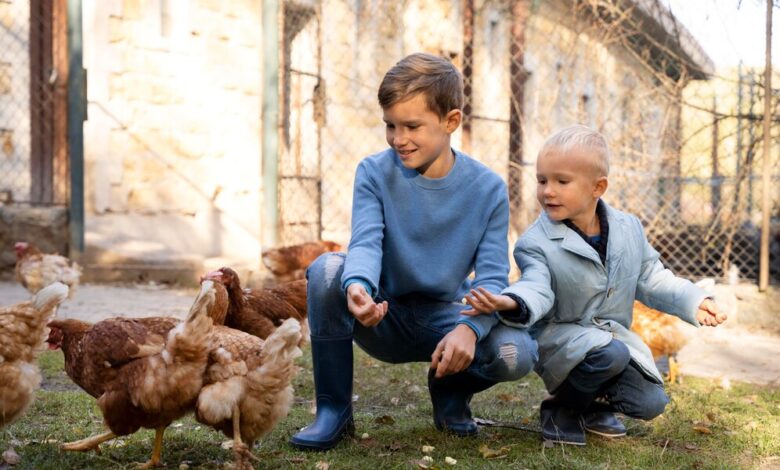A Fun and Educational Experience for Kids

In today’s fast-paced world, it can be challenging for parents to find engaging and educational activities for their kids. However, providing fun learning experiences doesn’t have to mean dry textbooks or screen time.
Creative, hands-on experiences keep young learners engaged while stimulating curiosity and problem-solving skills.
This blog will dive into various interactive activities that ensure your child has fun and learns something valuable. Get ready to unlock some exciting educational adventures!
1 – From Egg to Chick
One of the most exciting and interactive ways to teach children about biology is by incubating chicken eggs. This activity sparks fascination and creates a hands-on experience in which kids can witness the miracle of life firsthand.
The thrill begins as they observe the eggs developing over time, their natural curiosity piqued as they wonder what is happening inside. Soon, they’re learning about the stages of embryonic growth, gaining a deeper understanding of how life evolves long before the chick emerges.
In addition to the life sciences lesson, nurturing embryonic chickens teaches children valuable skills like responsibility and patience. They must monitor the incubator’s temperature and humidity, turn the eggs, and observe the progress daily—all essential actions for ensuring the success of the hatch.
Every day brings a discovery, reinforcing the concept of delayed gratification as they eagerly wait for the hatching day. This responsibility also helps children develop empathy and respect for life as they become caretakers for the tiny creatures growing inside the eggs.
2 – Gardening Projects
Gardening teaches kids patience, responsibility, and an appreciation for nature. It gets them away from screens and into the fresh air, a refreshing break from typical academic activities.
By caring for plants, children learn about the life cycle of flora, the importance of nurturing living things, and the role that elements like water, sunlight, and soil play in growth.
Each day presents new opportunities for the workers to observe changes and take pride in their work, making it an engaging way to foster a hands-on connection with nature.
Gardening also encourages sustainability and healthy habits, as children can later enjoy the fruits—or vegetables—of their labor, deepening their understanding of where food comes from and promoting an environmentally conscious mindset.
| Ask Thought-Provoking Questions: Don’t rush to supply answers. Ask your child questions to provoke their critical thinking, encouraging them to experiment and explore. |
3 – Interactive Science Experiments
Get your kids energized about science with simple, hands-on experiments. The beauty of home science is that it doesn’t have to be complicated or expensive. Most can be pulled off with essential household ingredients.
One classic example is a DIY volcano! You only need baking soda, vinegar, dish soap, and food coloring. Let your child mold the volcano out of clay or sand and pour the baking soda-vinegar mixture inside, allowing them to “erupt” it multiple times.
As the faux lava flows, you can explain how actual volcanic activity works, fueling their curiosity about Earth’s geology. They’ll have a blast—quite literally—while learning valuable chemistry and natural science lessons.
4 – Creative Arts & Crafts
Kids are inherently creative. Using their imaginations through art can lead to fun and learning. Crafting encourages inventive thinking, problem-solving, and fine motor skills.
With a few flat stones and paint, you can create “story stones.” Let children design symbols or pictures on the rocks (like a tree, house, dog, ocean, etc.).
Once the stones are finished, the real learning and fun begin. Mix up the rocks and ask your child to organize them to tell a story. This activity strengthens narrative skills, critical thinking, and imagination.
Plus, it makes for a great family bonding time when you can sit together and listen to the stories your child invents.
See also: How To Choose The Right Sports School In Austin, Texas?
5 – STEM Building Projects
Photo by prostooleh on freepik.com
Alt Text: little children playing Lego blocks
With the increasing importance of STEM (Science, Technology, Engineering, and Math) in today’s world, fostering those skills early can give your child a head start. The building also encourages patience, focus, and collaboration.
Lego sets are fantastic for sparking creativity, but they’re also a unique way for kids to think like engineers. Set a challenge for your kids to build something specific, like a bridge that can hold weight or a car that moves.
As they brainstorm, design, and problem-solve, they learn about balance, gravity, friction, and more. You can even add time limits for extra fun and focus.
Don’t have Lego sets on hand? Try cardboard boxes, popsicle sticks, or whatever materials you have.
| Link Lessons to Real-World Applications: Connect what they learn to real contexts. Use daily interests, like toy cars or cooking, to explain science, math, or planning. |
6 – Imaginative Outdoor Adventures
Outdoor exploration is a naturally fun and educational experience for kids. From scavenger hunts to nature hikes, the great outdoors provides endless possibilities for learning more about the world.
Plan a scavenger hunt that turns your walk in the park into an exciting adventure. Prepare a list of items for kids to find—such as a pinecone, a bird, a butterfly, or a flower.
You can teach them about each item as they check it off the list. As they engage with their environment, explain what birds eat, how plants grow, and other natural ecosystems. This will promote curiosity while helping them build observation skills.
Plus, it’s a great way to exercise while spending quality time together.
Fun Meets Learning in Every Activity
Creating fun and educational experiences for your kids doesn’t require a massive budget or extended preparation. What matters most is playfully nurturing their natural curiosity.
Every activity listed above blends entertainment with development, ensuring your child learns vital skills—whether it’s a new math concept, problem-solving skills, or an appreciation for the natural world—while having a blast!
So, the next time you wonder, “What now?” Gather your little learners and embark on an educational journey to captivate their hearts and minds, reinforcing that learning is a delightful, never-ending adventure.


